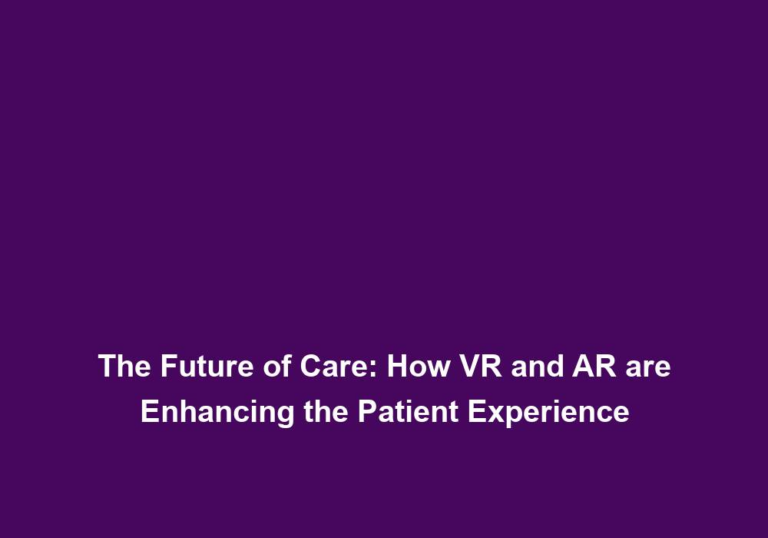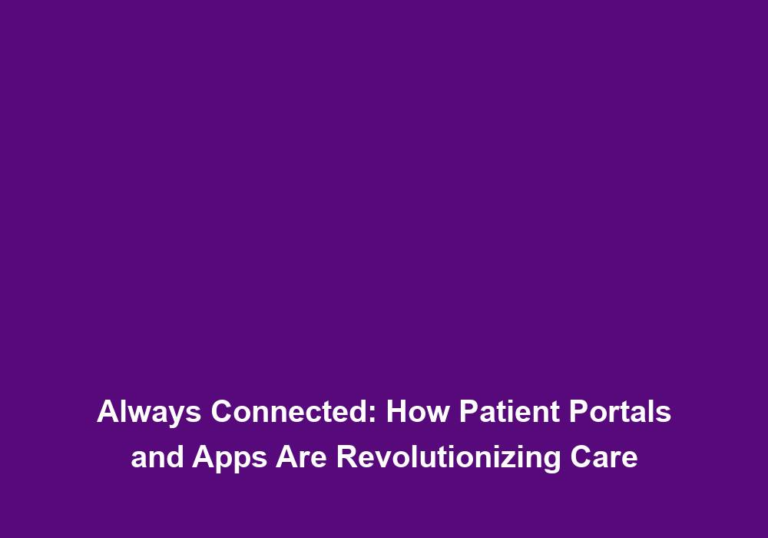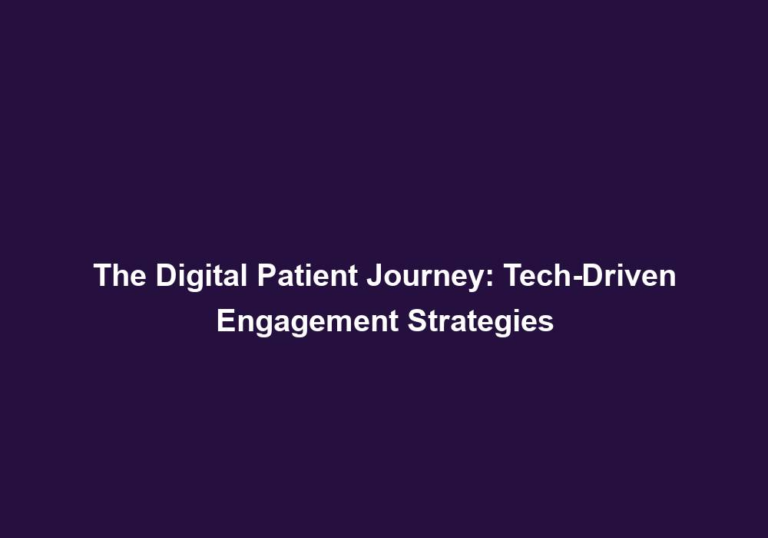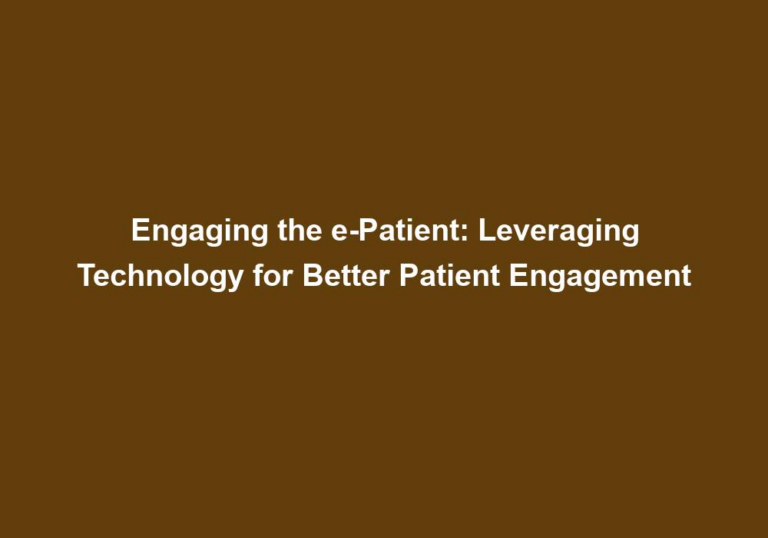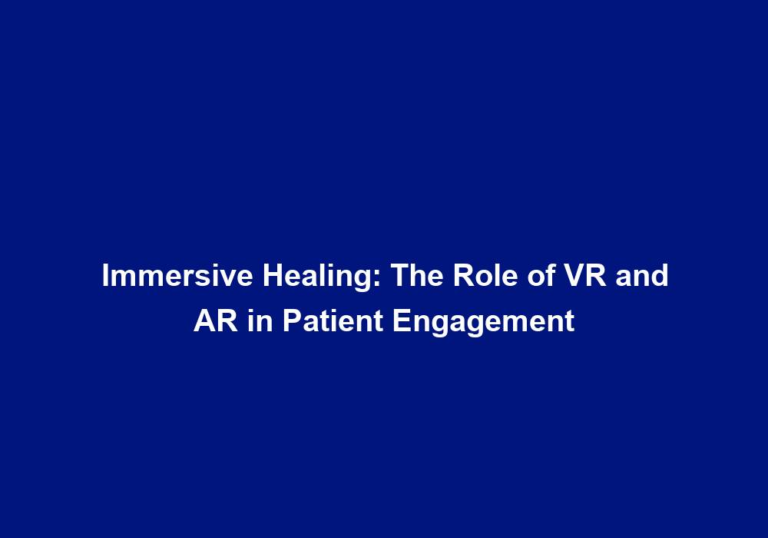Access at Their Fingertips: The Power of Patient Portals and Apps
In today’s digital age, technology has revolutionized the way we interact with various services, and healthcare is no exception. Patient portals and mobile apps have emerged as powerful tools that provide patients with convenient access to their healthcare information and empower them to take control of their own well-being. This article delves into the various benefits and functionalities of patient portals and apps, highlighting their significant impact on the healthcare industry.
The Rise of Patient Portals and Apps
Patient portals and mobile apps have gained significant popularity in recent years, primarily due to their ability to enhance communication between patients and healthcare providers. These platforms serve as a secure online gateway that allows patients to access their medical records, schedule appointments, request prescription refills, communicate with their healthcare team, and obtain personalized health information.
Empowering Patients with Information
One of the key advantages of patient portals and apps is their ability to provide patients with access to their medical records anytime and anywhere. Gone are the days when patients had to rely solely on their healthcare providers to obtain copies of their medical histories. With a few clicks, patients can now view their lab results, medication lists, immunization records, and other vital health information. This not only promotes transparency but also ensures that patients have a comprehensive understanding of their health status.
Moreover, patient portals and apps often offer a wealth of educational resources that are tailored to individual patients’ needs. These resources can range from articles and videos about specific medical conditions to self-help tools and interactive modules. By providing patients with reliable and easily accessible information, patient portals and apps enable individuals to make informed decisions about their health and adopt healthier lifestyle choices.
Seamless Appointment Management
Patient portals and apps have simplified the process of scheduling appointments. Instead of waiting on hold or playing phone tag with receptionists, patients can conveniently book appointments online, selecting a date and time that suits their schedule. This not only reduces patient frustration but also optimizes the workflow for healthcare providers, enabling them to manage appointments more efficiently.
Additionally, patient portals and apps can be programmed to send reminders for upcoming appointments, ensuring that patients do not miss their scheduled visits. These reminders help patients stay on top of their healthcare requirements, reducing the likelihood of missed appointments or forgotten medications. By promoting medication adherence and timely interventions, patient portals and apps contribute to better treatment outcomes and overall patient well-being.
Prescription Refill Requests Made Easy
Gone are the days of remembering to call the pharmacy during their working hours to request prescription refills. Patient portals and apps allow patients to submit refill requests electronically, saving time and ensuring that their medications are ready for pickup or delivery when needed. This feature also reduces the chance of errors, as patients can directly access their medication lists and request the correct prescriptions.
Moreover, patient portals and apps can track medication adherence and send reminders for refills. This not only helps patients stay on top of their medication schedules but also ensures that they have a continuous supply of necessary medications, promoting better treatment outcomes.
Enhancing Communication and Care Coordination
Effective communication is the cornerstone of quality healthcare. Patient portals and apps facilitate secure messaging between patients and healthcare providers, enabling them to ask questions, seek clarifications, and receive timely responses. This direct line of communication enhances care coordination and eliminates unnecessary visits or phone calls.
Furthermore, patient portals and apps can include features that allow patients to track their health metrics, such as blood pressure, blood sugar levels, and physical activity. By regularly monitoring these metrics, patients can gain insights into their health trends and identify potential issues early on. This self-tracking not only promotes personal accountability but also facilitates a proactive approach to healthcare management.
The Impact on Patient Engagement and Outcomes
Patient engagement is a crucial factor in improving healthcare outcomes, and patient portals and apps play a significant role in fostering active patient participation. By providing patients with convenient access to their health information, these platforms empower individuals to take charge of their health and engage in shared decision-making with their healthcare providers.
Access to Educational Resources
Patient portals and apps often offer a wealth of educational resources that are tailored to individual patients’ needs. These resources can range from articles and videos about specific medical conditions to self-help tools and interactive modules. By providing patients with reliable and easily accessible information, patient portals and apps enable individuals to make informed decisions about their health and adopt healthier lifestyle choices.
Moreover, patient portals and apps can include features that allow patients to track their health metrics, such as blood pressure, blood sugar levels, and physical activity. By regularly monitoring these metrics, patients can gain insights into their health trends and identify potential issues early on. This self-tracking not only promotes personal accountability but also facilitates a proactive approach to healthcare management.
Reminders and Medication Adherence
Patient portals and apps can be programmed to send reminders for upcoming appointments, medication refills, and preventive screenings. These reminders help patients stay on top of their healthcare requirements, reducing the likelihood of missed appointments or forgotten medications. By promoting medication adherence and timely interventions, patient portals and apps contribute to better treatment outcomes and overall patient well-being.
Moreover, patient portals and apps often include medication reminders and tracking features. Patients can set reminders for taking medications and track their adherence to prescribed regimens. This not only helps patients stay on track with their medication schedules but also allows healthcare providers to monitor and intervene if necessary, ensuring optimal treatment outcomes.
Personalized Health Tracking
Many patient portals and apps include features that allow patients to track their health metrics, such as blood pressure, blood sugar levels, and physical activity. By regularly monitoring these metrics, patients can gain insights into their health trends and identify potential issues early on. This self-tracking not only promotes personal accountability but also facilitates a proactive approach to healthcare management.
Furthermore, patient portals and apps can provide personalized recommendations based on the tracked health metrics. For example, if a patient’s blood pressure readings consistently fall outside the normal range, the app can suggest lifestyle modifications or prompt the patient to schedule a follow-up appointment with their healthcare provider. This personalized approach to health tracking empowers patients to actively manage their health and make informed decisions.
Future Perspectives: Advancements and Potential Challenges
The future of patient portals and apps holds immense potential for further advancements. As technology continues to evolve, these platforms may incorporate features such as telehealth consultations, artificial intelligence-driven chatbots, and seamless integration with wearable devices. These advancements have the potential to revolutionize healthcare delivery, making it more patient-centric, efficient, and accessible.
However, along with the opportunities, there are also potential challenges that need to be addressed. Ensuring data security, usability for individuals with varying technological literacy, and equitable access to these digital solutions are areas that require careful attention. By addressing these challenges, patient portals and apps can continue to evolve and provide even greater benefits to patients and healthcare providers alike.
In conclusion, patient portals and mobile apps have transformed the healthcare landscape by empowering patients with access to their health information, seamless appointment management, and enhanced communication with healthcare providers. These digital tools have the potential to significantly improve patient engagement, outcomes, and overall healthcare experience. As technology continues to advance, patient portals and apps will undoubtedly play an increasingly vital role in shaping the future of healthcare.


